中考英语重点词汇和句型用法总结
初中英语重点句型短语中考必背
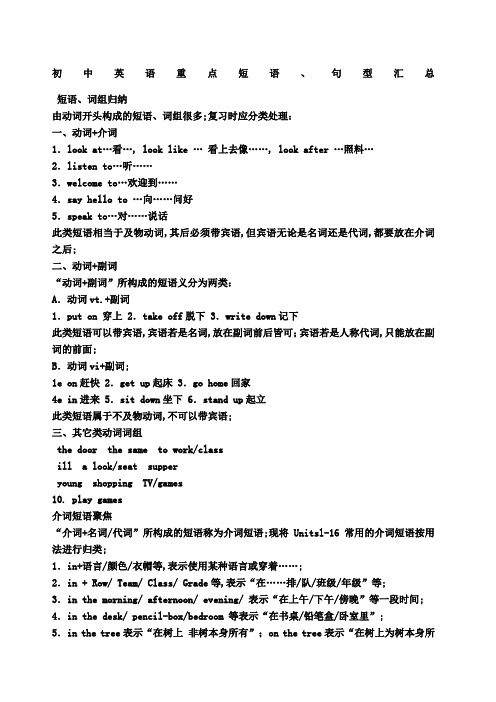
初中英语重点短语、句型汇总短语、词组归纳由动词开头构成的短语、词组很多;复习时应分类处理:一、动词+介词1.look at…看…, look like … 看上去像……, look after …照料…2.listen to…听……3.welcome to…欢迎到……4.say hello to …向……问好5.speak to…对……说话此类短语相当于及物动词,其后必须带宾语,但宾语无论是名词还是代词,都要放在介词之后;二、动词+副词“动词+副词”所构成的短语义分为两类:A.动词vt.+副词1.put on 穿上 2.take off脱下 3.write down记下此类短语可以带宾语,宾语若是名词,放在副词前后皆可;宾语若是人称代词,只能放在副词的前面;B.动词vi+副词;1e on赶快 2.get up起床 3.go home回家4e in进来 5.sit down坐下 6.stand up起立此类短语属于不及物动词,不可以带宾语;三、其它类动词词组the door the same to work/classill a look/seat supperyoung shopping TV/games10. play games介词短语聚焦“介词+名词/代词”所构成的短语称为介词短语;现将Unitsl-16常用的介词短语按用法进行归类;1.in+语言/颜色/衣帽等,表示使用某种语言或穿着……;2.in + Row/ Team/ Class/ Grade等,表示“在……排/队/班级/年级”等;3.in the morning/ afternoon/ evening/ 表示“在上午/下午/傍晚”等一段时间; 4.in the desk/ pencil-box/bedroom 等表示“在书桌/铅笔盒/卧室里”;5.in the tree表示“在树上非树本身所有”;on the tree表示“在树上为树本身所有”;6.in the wall表示“在墙上凹陷进去”;on the wall表示“在墙上指墙的表面”; 7.at work在工作/at school上学/at home在家应注意此类短语中无the;8.at + 时刻表示钟点;9.like this/that表示方式,意为“像……这/那样”;10.of短语表示所属关系;11.behind/ beside/ near/ under+ 名词等,表示方位、处所;12.from与to多表示方向,前者意为“从……”,后者意为“到……”;另外,以下这些短语也必须掌握;如:on duty, after breakfast, at night, at the door, in the middle, in the sky, on one’s bike等;重点句型大回放1.I th ink…意为“我认为……”,是对某人或某事的看法或态度的一种句型;其否定式常用I don’t think…,2.give sth. to sb./ give sb. sth. 意为“把……给……”,动词give之后可接双宾语,可用这两种句型;若指物的宾语是人称代词时,则只能用give it/ them to sb. 3.take sb./ sth. to…意为“把……送带到……”,后常接地点,也可接人; 4.One…, the other…/One is…and one is…意为“一个是……;另一个是……”,必须是两者中;5.Let sb. do sth. 意为“让某人做某事”,人后应用不带to的动词不定式,其否定式为Don’t let sb,do sth.,或Let sb. not do sth. 另外,Let’s 与Let us的含义不完全相同,前者包括听者在内,后者不包括听者在内,6.help sb. to do sth./help sb. with sth.意为“帮助某人做某事”,前者用不定式作宾补,后者用介词短语作宾补,二者可以互换.7.What about…/How about…意为“……怎么样”是用来询问或征求对方的观点、意见、看法等;about为介词,其后须接名词、代词或V-ing等形式;8.It’s time to do…/ It’s time for sth. 意为“该做……的时间了”,其中to 后须接原形动词,for后可接名词或V-ing形式;9.like to do sth./like doing sth.意为“喜欢做某事”, 前一种句型侧重具体的一次性的动作;后一种句型侧重习惯性的动作,10.ask sb.not to do sth. 意为“让某人不要做某事”,其中ask sb.后应接动词不定式,11.show sb. sth. / show sth. to do. 意为“把某物给某人看”,该句型的用法同前面第2点;12.introduce sb. to sb. 意为“把某人介绍给另一人”;introduce to sb.则是“向某人作介绍”;重点短语快速复习of 各种各样的2. either…or…或者……或者……,不是……就是……3. neither…nor…既不……也不……4. Chinese tea without, anything in it 中国清茶5. take a seat 就坐6. home cooking 家常做法7. be famous for 因……而著名8. on ones way to在……途中9. be sick/ill in hospital生病住院10. at the end of在……的尽头,在……的末尾11. wait for 等待12. in time 及时13. make one’s way to…往……艰难地走去14. just then 正在那时15. first of all 首先,第一16. go wrong 走错路17. be/get lost 迷路18. make a noise 吵闹,喧哗19. get on 上车20. get off 下车21. stand in line 站队22. waiting room 候诊室,候车室23. at the head of……在……的前头24. laugh at 嘲笑25. throw about 乱丢,抛散26. in fact 实际上27. at midnight 在半夜28. have a good time=enjoy oneself玩得愉快29. quarrel with sb. 和某人吵架30. take one’s temperature 给某人体温31. have/get a pain in…某处疼痛32. have a headache 头痛33. as soon as… 一……就……34. feel like doing sth. 想要干某事35. stop…from doing sth. 阻止……干某事36. fall asleep 入睡37. again and again再三地,反复地38. wake up 醒来,叫醒39. instead of 代替40. look over 检查41. take exercise运动42. had betternot do sth. 最好不要干某事43. at the weekend 在周末44. on time 按时45. out of从……向外46. all by oneself 独立,单独47. lots of=a lot of 许多48. no longer/more=not…any longer/more 不再49. get back 回来,取回50. sooner or later迟早51. run away 逃跑52. eat up 吃光,吃完53. run after 追赶54. take sth. with sb. 某人随身带着某物55. takegood care of…=look after…well 好好照顾,照料56. think of 考虑到,想起57. keep a diary 坚持写日记58. leave one by oneself 把某人单独留下59. harder and harder 越来越厉害60. turn on打开电灯、收音机、煤气等61. turn off 关重温重点句型1.So + be/助动词/情牵动词/主语.前面陈述的肯定情况也适于另一人物时,常用到这种倒装结构,表示“另一人物也如此;”前面陈述的否定情况也适于另一人物时,常用“Neither/ Nor + be/助动词/情态动词+主语.”这种倒装结构;注意:“So+主语+be/助动词/情态动词.”这一句型常用于表示赞同,进一步肯定对方的看法,表示“的确如此;”“是呀;”2.Turn right/left at the first/second/…crossing.这一指路的句型意为“在第一/二/……个十字路口向右/左拐;”相当于Take the first /second/…turning on theright/left.3.It takes sb.some time to do sth.此句型表示“干某事花了某人一段时间;”其中的it是形式主语,后面的动词不定式短语才是真正的主语.4.…think/find + it + adj. + to do sth.此句型中的it是形式宾语,不可用其它代词替代,形容词作宾语的补足语,后面的动词不定式短语才是真正的宾语;5.What’s wrong with…此句型相当于What’s the matter/ trouble with…后跟某物作宾语时,意为“某物出什么毛病了”后跟某人作宾语时,意为“某人怎么了”6.too…to…在so…that…复合句中,that后的句子是否定句时,常与简单句too…to…太……而不能……进行句型转换;在so…that…复合句中,that后的句子是肯定句时,常与简单句…enough to…进行句型转换.7.Sorry to hear that.全句应为I’m sorry to hear that. 意为“听到此事我很难过遗憾;”常用于对别人的不幸表示同情、遗憾之意;重点句型、词组大盘点1. She used to be a Chinese teacher. 她过去是一位汉语老师;用法 used to + 动词原形,表示过去经常性的动作或存在的状态,含有现在不再如此之意;搭配 used to do的否定式可以是usedn’t to do或didn’t use to do.比较 used to do sth. 过去常做某事;be/ get used to doing sth. 习惯于做某事;be used to do sth. 被用来做某事;2.…return it sooner or later.……迟早要将它归还;用法 lsooner or later意为“迟早”、“早晚”;2return此处用作及物动词,意为“归还”,相当于give back.拓展return还可用作不及物动词,意为“返回”,相当于go back或come back; matter what the weather is like…无论天气…… 用法no matter what 相当于whatever,其意为“无论什么”,引导状语从句; 拓展类似no matter what的表达方式还有: no matter when无论什么时候 nbsp; nbsp;nbsp;no matter where无论什么地方 no matter who无论谁 no matter how 无论怎么样 4. A young man practised speakingEnglish with Mr. Green. 一位年经人与格林先生练习讲英语; 用法practise doing sth. 表示“实践、练习做某事”; 拓展practice名词,“实践”、“实施”、“练习”;put a plan into practice实行某计划; 5. He encouraged everyone to take part in protecting our lakes, rivers, seas and oceans. 他鼓励大家参加保护我们的湖泊、河流和海洋的活动; 用法1encourage用作动词,意思是“鼓励”、“支持”; 2take part in“参加”,常表示参加活动; 3protect 是动词,表示“防御”、“保护”; 搭配1encourage sb. in sth.在某事上鼓励或支持某人 nbsp;encourage sb. to do sth.鼓励某人干某事 2protect sh. from sth.使某人不受某事侵袭或伤害 6. …to warn people about sharks in the water. ……警告人们当心水里的鲨鱼; 用法 warn用作动词,意思是“警告”、“警戒”; 搭配1warn sb.+ that从句 2warn sb. of sth. 警告某人某事 3warn sb. to do sth.告诫某人做某事 4warn sb. againstdoing sth.告诫某人当心某事/不要做某事重点句型、词组大盘点 1. She used to be a Chinese teacher. 她过去是一位汉语老师; 用法 used to + 动词原形,表示过去经常性的动作或存在的状态,含有现在不再如此之意; 搭配 used to do的否定式可以是usedn’t to do或didn’t use to do. 比较 used to do sth. 过去常做某事;be/ get used to doing sth. 习惯于做某事;be used to do sth. 被用来做某事; ……短语总结1.It’s time for sth. 该到做某事的时间了.2.It’s time to do sth.It’s time for sb. to do sth 该到某人做某事的时间了.3. 2. can’t wait to do sth. 迫不及待地要求做某事.4. 3. ask tellsb. not to do sth . 请告诉某人不做某事.5. 4. make/let sb. to do sth. 让某人做某事.6. 5. hear/see/sb. do sth 听见/看见某人做某事.7. 6. had betternot do sth 最好不做某事.8.7. It’s better to do sth最好做某事9.8. It’s best to do sth最好做某事10.9. enjoy 喜欢做某事11.10. finish 结束做某事12.11. keep 继续做某事13.12. keep on doing sth. 继续做某事14.13. carry on 继续做某事15.14. go on 继续做某事16.15. feel like 喜欢做某事17.16. stop to do sth 与stop doing sth 停下来去做某事与停止做某事.18.17. forget/remember to do 与 forget/remember doing sth.忘记/记得去做某事与忘记/记得曾经做过事.19.18. keepprecent,stopsb. from doing sth阻止/防止/阻栏栽人做某事20.19. prefer….to ……喜欢…..胜过……21.20. prefer to do sth. rather than do ath.宁愿做某事,而不原做某事.22.21. used to do sth.过去常常做某事.23.22. What’s wong with…… …..出了问题事24.23. have not hing to do with….. 与…..无关25.24. be busy doing sth . 在忙于做某事26.25. too…..to….. 太……以致知于不……27.26. so ……that ….. 如此….. 以致知于不……28.27. such…..that…… 如此….. 以致知于不……29.28. It take sb. some time to do sth .某人做某事用了一些时间.30.29. spend …..on sth.doing sth.花钱/时间做某事.31.30. pay…..f or sth.花费钱买某物.32.31. What /how about…… …….怎么样好吗33.32. would like to do sth .想要/愿意做某事..34.33. I don’t think that我认为……不…..35.34. Why not do sth. Why don’t you do sth .为什么不做某事呢36.35. What do you mean by….你….是什么意思37.36. What do you think of …..How do you like ….你认为….怎么样 37. Mikeenjoys collecting stamps . So do I.迈克喜欢集邮.我也也喜欢. 38. The more, the better . 越多越剧好. 39. Thanks for doing sth.谢谢你做了某事. 40. It is said that….. 据说……1 see 、hear 、notice 、find 、feel 、listen to 、 look at 感官动词+ doeg :I like watching monkeys jump.2 比较级 and 比较级表示越来越怎么样3 a piece of cake =easy 小菜一碟容易4 agree with sb 赞成某人5 all kinds of 各种各样 a kind of 一样6 all over the world = the whole world 整个世界7 along with 同……一道,伴随……eg : I will go along with you 我将和你一起去The students planted trees along with their teachers 学生同老师们一起种树8 As soon as 一怎么样就怎么样9 as you can see 你是知道的10 ask for ……求助向…要…直接接想要的东西 eg : ask you for my book 11 ask sb for sth 向某人什么 12 ask sb to do sth 询问某人某事 ask sb not to do 叫某人不要做某事13 at the age of 在……岁时eg:I am sixteen I am at the age of sixteen14 at the beginning of …………的起初;……的开始15 at the end of +地点/+时间最后;尽头;末尾 eg : At the end of the day16 at this time of year 在每年的这个时候17 be /feel confident of sth /that clause +从句感觉/对什么有信心,自信eg : I am / feel confident of my spoken English.I feel that I can pass the test. 18 be + doing 表:1 现在进行时 2 将来时 19 be able to + v 原 = can + v 原能够……eg : She is able to sing She can sing20 be able to do sth 能够干什么 eg :she is able to sing21 be afraid to do of sth 恐惧,害怕…… eg : I'm afraed to go out at night I'm afraid of dog22 be allowed to do 被允许做什么eg:I'm allowed to watch TV.我被允许看电视I should be allowed to watch TV.我应该被允许看电视23 be angry with sb 生某人的气 eg : Don't be angry with me24 be angry withat sb for doing sth 为什么而生某人的气25 be as…原级…as和什么一样 eg : She is as tall as me 她和我一样高26 be ashamed to27 be away from 远离28 be away from 从……离开29 be bad for 对什么有害 eg : Reading books in the sun is bad for your eyes 在太阳下看书对你的眼睛不好30 be born 出生于31 be busy doing sth 忙于做什么事 be busy with sth 忙于……32 be careful 当心;小心33 be different from……和什么不一样34 be famous for 以……著名35 be friendly to sb 对某人友好36 be from = come from 来自eg :He is from Bejing. He comes from Bejing.Is he from Bejing Does he come from Bejing 37 be full of 装满……的 be filled with 充满eg: the glass is full of water. the glass is filled with water.38 be glad+to+do/从句39 be going to + v原将来时40 be good at+doing = do well in 在某方面善长, 善于……41 be good for 对什么有好处 eg : Reading aloud is good for your English42 be happy to do 很高兴做某事43 be helpful to sb 对某人有好处eg : Reading aloud is helpful to you 大声朗读对你有好处Exercising is helpful to your bady 锻炼对你的身体有好处44 be in good health 身体健康45 be in trouble 处于困难中eg : She is in trouble. They are in tronble.46 be interested in 对某方面感兴趣47 be late for = come late to 迟到 eg: Be late for class 上课迟到48 be like 像…… eg : I'm like my mother49 be mad at 生某人的气50 be made from 由……制成制成以后看不见原材料51 be made of 由……制成制成以后还看得见原材料52 be not sure 表不确定53 be on a visit to 参观54 be popular with sb 受某人欢迎55 be quiet 安静56 be short for 表的缩写 eg: 陶 is short for 陶俊杰57 be sick in bed 生病在床58 be sorry to do sth be sorry for sb eg : I am sorry for you.59 be sorry to hear that60 be sorry to trouble sb eg : I am sorry to trouble you.61 be strict in doing sth 严于做某事 eg : He's strict in obeying nole.62 be strict with sb 对某人要求严格eg: Some students are not strict with them selves.这些学生对自己不严格 63be strict with sb in sth 某方面对某人严格 64 be supposed to do 被要求干什么 65 be sure 表确定 66 be sure of doing sth 对做某事有信心eg: He is sure of winning. I am sure of learning English well. 67 be sure of sth 对做某事有信心eg: I'm sure of my head my teacher. 我相信我的大脑老师 68 be sure that sth 对做某事有信心eg: I'm suer that he can pass the test. 我相信他能通过考试69 be sure to do sth 一定会做某事eg: We are sure to pass the test. 我们一定会通过这次考试We are sure to learn English well. 我们一定能学好英语70 be terrified of + 名/动doing 害怕……71 be terrified to do sth 害怕做某事72 be the same as …和什么一样73 be used to doing sth 习惯做某事eg: My father is used to getting up early. 我爸爸习惯早起 He is used to sleeping in class. 他习惯上课睡觉He is used to working hard.He is used to hard work 他习惯努力工作 74 be worth doing 值得做什么 75 befeel afraid to do sth 害怕做某事be afraid of sth害怕某物be afraid that 丛句76 because+句子 because of +短语eg : He was late because he had a headache.He was late because of his headache. 77 begin to do = start to do 开始做某事start…with…=begin…with… 以什么开始什么eg : Let's begin the game with the song. I begin to go home. 78 between…and…两者之间 79 borrow sth from sb 向……借……lend sth to sb lend sb sth 借给……什么东西eg : I borrowed a pen from him he lent a pen to me he lent mea pen80 both = the sameas = not differentfrom 表相同81 bother 打扰 bother sb to do stheg : I'm sorry to bother you ,but can you tell me to way to the station 我十分道歉打扰你,但是你能告诉我怎么去车站the problem has been bothering me for weeks 这个问题困扰了我几个周了He's bothering me to lend him money82 by the end of 到……为止83 call sb sth eg : We call him old wang84 care 关心 eg : Don't you care about this country's future 你为什么不关心国家的未来85 catch up with sb 赶上某人86 chat with sb 和某人闲谈 take sb to + 地点带某人去某地87 come in 进来88 come over to 过来89 come up with 提出 eg: Can you come up with a good idea 你能想出一个好办法吗90 communicate with sb 和某人交流91 consider + doing 考虑做什么 eg : Why not consider going to lu zhou 为什么不考虑去泸州 92 dance to 随着……跳舞 eg : She likes dancing to the music 她喜欢随着音乐跳舞 93 decide to do sth 决定做某事94 do a survey of 做某方面的调查95 do better in 在……方面做得更好96 do wrong 做错97 Don't forget to do sth 不要忘了做某事98 Don't mind +doing /从句 /名词不要介意……99 each +名单每一个…… eg : Each student has many books 每一个学生都有一些书100 end up +doing101 enjoy +doing 喜欢102 escape from 从……逃跑eg: The prisoners have escaped from the prison 犯人从监狱里逃跑出来Some gas is escaping from the pipe 有一些气体从管子里冒出103 expect to do sth 期待做某事104 fall down 摔下来 fall off 从哪摔下来105 fall in love with sb /sth 爱上什么106 far from 离某地远 eg : The school is far from my home107 find +it +adj +to do 发现做某事怎么样108 find sb/sth +adj 发现什么怎么样eg : I find the book interesting 109 finish 完成+doing名词 110 fit to sb = be fit for sb 适合某人111 forget to do 没有做而忘了forget doing 做了而又忘了 eg: Don't forget to go home I forget closing door 112 from…to…从某某到某某 eg: From me for her 113 get /have sth down 做完,被别人做…… eg: I have my hair cut 我理了发头发被剪了Tom got his bad tooth pulled out 汤母把他的坏牙拔掉了被牙医拔掉了 114 get a part-time job = find a part-time job 115 get along well with sb = get on well with sb 与某人相处得好 116 get along with sb = get on with sb 与某人相处 117 get ready for = be ready for 为什么而准备 eg : I get ready for math I am ready for math 118 get sb in to trouble 给某人麻烦119 get sb to do sth 120 get…from… 从某处得到某物 121 give a talk 做报告 eg: He is give a tall 122 give sth to sb give sb sth 给某人某物123 go fish 钓鱼go swimming 游泳 124 go on to do 去做下一件事 go on doing 继续做这件事 125 go out away from go out of 126 go to school 上学用于专业的go to the school 去学校不一定是上学 127 good way to 好方法128 hate to do 讨厌没做过的事 hate doing 讨厌做过的事 129 have a party for sb 举办谁的晚会 130 have a talk 听报告谈一谈 131 have been doing 现在完成进行时eg : You have been talking You have been sleeping since 132 have been to …地方……去过某过地方have gone to …地方去了某地还没回来133 have fun +doing 玩得高兴134 have sth to do 有什么事要做eg: I have a lot of homework to do 我有很多家庭作业要做I have nothing to do 我没什么事情做135 have to do sth 必须做某事136 have trouble problem in doing sth 做什么事情有麻烦137 have…time +doing138 have…时间…off放……假 eg: I have month off 我请一个月得假139 hear sb +do/doing 听见某人做某事/正在做某事140 help a lot 很大用处141 help sb with sth one's sth 帮助某人某事某方面 help sb to do sth 帮助某人做某事142 hope to do sth 希望做某事143 How about+doing = What about+doing144 how do you like = what do you think of 你对什么的看法145 if : 是否=wethereg: I don't know if wether I should go to the party 我不知道我是否应该去参加晚会He don't know if wether we will arrive on time tomorrow morning 他不知道我们明天早上是否能准时到达146 if :如果-- 中国英语学习网,中国英语第一门户 -->偃纾ㄈ拷右话闶碧跫锾泳amp;nbsp;eg:I'll go to LuZhou if it does't rain 假如明天不下雨,我就去泸州If they change the plan they will let me know假如他们要改变计划,他们会让我知道的I'll go to England ,if I have enough money next year如果我明年由足够的钱,我就要去英国147 in one's opinion = sb think 某人认为148 in some ways 在某些方面149 in the end = finallyadv 最后150 in the north of…什么在什么的北方north 北 sowth 南 west 西 east 东151 in the sun 在太阳下152 increase 增加eg :They've increased the prece of petrol by 3%.他们把石油价增加了3%the population has increased from 12 million ten years ago to 18 million now153 instead of +名代替eg: I'd like an apple instead of a pear 我想要苹果,而不要梨子I like English instead of math 我喜欢英语而不喜欢数学154 introduce sb to sb 介绍某人给某人 introduce oneself 自我介绍155 invite sb to do sth 邀请某人做某事156 It takes sb sometime to do sth 做某人花掉某人多少时间eg : It took me 5 minutes to do my homework It takes me half an hour to cook157 It's +adj +for sb to do sth 对某人来说做某事怎么样158 It's +adj +to do 做某事怎么样159 It's +adj for sb 对于某人来说怎么样 It's +adj of sb 对某人来说太怎么样160 It's +adjfor sb to do对某人来说做某事怎么样 It's +adj of sb to do sth 对某人来说做某事太怎么样eg : It's nice of you to help me with my English 161 It's a good idea for sb to do sth 对……来说是个好主意162 It's important to sb 对某人来说很重要 eg: It's important to me163 It's time to do sth It's time for sth 到了该去做某事的时间eg : It's time to have class It's time for class 该去上课了 164 join = take part in 参加165 just now 刚才166 keep +sb /sth +adj /介词短语让什么保持什么样 167 keep out 不让…… 进入 168 keep sb adj 让……保持…… eg: I want to keep my mother happy keep healthy 保持健康 169 key to +名词表示:某物的钥匙或某题的答案170 key to… anser to … key 可以是答题或钥匙 171 laugh at… 取笑…… eg : Don't langh at others We langhed at the joke 172 learn by oneslfe 自学 173 learn from sb 向某人学习 eg: We should learn from Lei Feng 174 learn to do sth 学做某事 175 let sb do sth 让某人做某事 176 Let sb down 让某人失望 eg : We shouldn't let our farents down 我们不应该让我们的父母失望 177 live from :离某地远 178 live in +大地方 /at +小地方居住在某地 eg: I live in LuZhou She lives at XuanTan 179 look after = take care of 照顾照看 180 lose one's way 谁迷路 eg : Lose your way 你迷路 181 make a decision to do sth 决定做某事 182 make friends with sb 和谁成为朋友 eg : I want to make friends with you 183 make it early 把时间定的早一点 184 make on exhibition of oneself 让某人出洋相185 make sb /n +n 使什么成为什么eg : I made her my step moller I made you my wife 186 make sb /sth +adj 使某人某物怎么样eg : You must made your bed clean 187 make sb /sth adj 使某人/某物怎么样 188 make sb do sth 让某人做某事 eg : I made him write我以前让他写 189 make up be made up of 被动语态由……组成 190make…difference to… 191 mind sb to do mind one's doing 介意……做什么 192 most +名 most of +代 193 much too +形容词 194 must be 一定 195 need +名词 196 need sb do sth 需要某人做某事 197 need to do 实义动词 need do 情态动词 198 no /neithr of hate to do no /neithr of hate doing 199 no +名词200 not anymore = no more 再也不……eg: He didn't cry any more He cried no more 他再也不哭201 not… 形、副at alleg: He's not tall at all she doesn't junp far at all 202 not…at all 一点都不203 not…either表否定,也不eg : I don't japanse either I don't have sister, either 我也没有姐姐 204 not…until直到……才…… eg: I didn't sleep until my mother came backThe child didn't stop crying until I give her sugar205 offer / provide sb with sth 给某人提供206 offer sb sth offer sth to sb 提供什么东西给某人 eg : I offer you water I offer water to you 我给你提供水207 on one's way to…在谁去那的路上208 on the one hand 一方面 on the other hand 另一方面 209 on the phone = over the phone 用电话交谈210 on time 准时 in time 及时211 one day =some day =someday 一天,有一天212 one of +可数名词的复数形式213 one to another 一个到另一个214 over and over agin一遍又一遍He cleaned the floor over and over agin 215 part-time job 兼职工作 fall-time job 全职工作 216 pay for…付……钱 pay the bill 开钱 ,付钱 217 please +do 218 please help yourself 219 pleased with sb 220 pool into = pore into 221 practice +doing 练习做某事222 prefer sth to sth 相对……更喜欢……eg : I prefer physics to chemisty 在物理和化学中,我更喜欢物理 prefer doing to sth 更喜欢去做…不愿意去做…eg: He prefers riding a bike to diving 他更喜欢骑自行车,不开小车prefer to do sth rather than do sth 宁愿做…也不愿eg:My unde prefers to buy a now car rather than repaiv the used one.我叔叔更喜欢买新的车,也不去修旧车prefer sb not to do sth 更愿意… I prefer her not to come我不喜欢她不来223 pretend to do sth 装着去做什么 pretend that 从句eg: The two cheats pretended to be working very hard这两个骗子装着努力工作He pretended that he did not know the answer 他装着不知道答案224 rather…than宁可……也不……eg : I would rather be a doctor than a teacher我愿肯当医生,也不当老师He likes dogs rather than cats 他喜欢狗,不喜欢猫225 regard…as把……当作…… eg: Please give my best regards to your family请带我向你的家人我最好的问候I regard you as my friend 我把你当作我的朋友He shows little regard for others 他不爱关心别人226 remid sb about sth 提醒某人什么事 remid sb to do sth 提醒某人做某事eg : he remids me about cooking he remids me to cook 他提醒我做饭227 remid sb of sth 使某人想起什么eg : the pictures remind me of my school days 这照片使我想起了我的学校the words that which the teacher talke to remind me of my mother 228 return sth to sb 还什么东西给某人229 say to oneself 对自己说230 say to sb 对某人说231 sb spend somemoney on sth 花了多少钱在某事上232 sb spend sometime with sb 花了多少时间陪谁233 sb spend sometimein doing sth 花了多少时间做某事234 sb with sb +is sb and sb +are235 see sb do 看见某人做过某事 see sb doing 看见某人正在做某事236 seem to do/be +adj 显得怎么样 eg : You seem to be tired You seem to be happy237 send +sb sth 送给某人某物238 send…to…把什么寄到哪里去239 shock 使……震惊eg : Oh , It's only you You give me a shock 啊,是你呀吓我一跳240 show sb sth 向某人展示某物 eg : I show her the book.241 show sb sth = show sth to sb 拿什么东西给某人看 eg: Show me your pen Show your pen to me242 show sth to sb 向某人展示某物 eg : I show the book to her. 243 some…others…一些……另一些……244 start…with…从……开始begin…with…从……开始245 stay away from 远离…… eg : We're told to stay away from the animals whe visiting the zoo当我们参观zoo 时,我们要远离动物If you want to lose weight you'd better stay auay from the sweet food 徒工你想减肥,你最好远离甜食246 stop doing 停下正在做的事247 stop sb from doing sth 阻止某人做某事248 stop sbfrom doing 阻止某人做某事249 stop to do 停下正在做的事去做下一件事250 such +名这样 ,这种251 suit sb 适合某人252 surprise sb 使某人惊奇 to one's surprise 令某人惊奇253 take classes 上课254 take sb to 把某人带去 eg : I take you to the hospital255 take walks = take a walk = go for a walk 散步256 ①talk to 对谁说 eg : I talk to you② talk with 和谁说 eg : I talk with him③ talk of 谈到 eg : we talked of you ④ talk about 谈论关于…… 257 talk with sb和某人说话 258 teach sb sth 教某人做某事 259 tell sb do sth 告诉某人做某事 260 tell sb sth tell sb that 丛句tell sb not to do sth tell a story 261 tell sb sth 告诉某人某事 262 tell sb to do sth 告诉某人做什么tell sb not to do sth 告诉某人不要做什么263 tell…from…264 thank you for +doing265 the same +名词doing+as……266 the same…名…as as…adj adv…as相同267 the way to do sth = the way of doing sth 做某方面的方法 the way to +地方去哪的路e g:Do you know the way to learn EnglishDo you know the way of learning English268 the way to…地点到哪的路269 too…to…太怎样而不能……adj +enough to 足够…能…so…that +丛句太…所以…He is too young to go to school=He is so young that he can't go to schoolHe is old enough to go to school= He is so old that he can go to school270 transalte ……into……把什么翻译成什 eg : Trasalte English into chinese271 travel with sb 和某人去旅游272 try one's best to do sth 尽某人最大的努力去做某事 eg: I will try my best to learn English well273 try to do sth 想干什么,但没成功 try doing sth 想干什么,已经做过了eg :He tried to climb 他想爬上去,但没成功He tried climbing 他想爬上去274 try…试衣服 have a try 试一下275 turn down 开小←→ turn up 开大276 turn off 关上←→ turn on 打开 open 拆开 277 upside down 倒着278 visit to…参观某个地方 279 wait for sb 等某人 280 wait for sb to do sth 等某人做什么 wait for sb 等某人wait for sometime 等多少时间eg : Would you please wait for me to get ready 等我准备好,好吗Let's wait for the rain to stop 让我们等雨停吧281 wake sb up 把某人叫醒282 want to do sth 想做某事283 watch sb do sth 观看某人做某事284 welcome to +…地方欢迎到……。
中考语法重点梳理总结
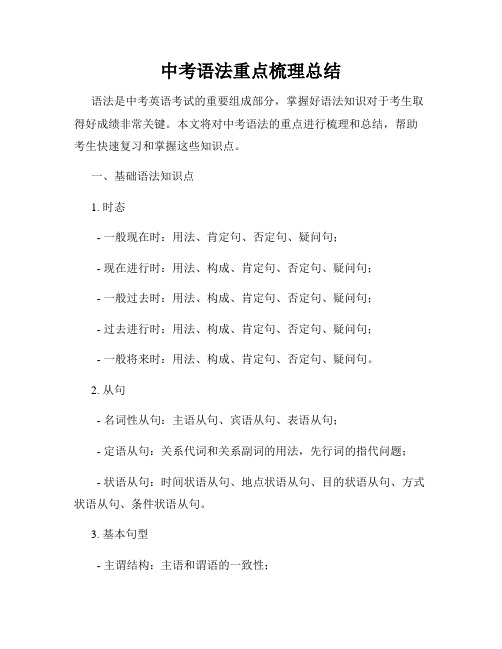
中考语法重点梳理总结语法是中考英语考试的重要组成部分,掌握好语法知识对于考生取得好成绩非常关键。
本文将对中考语法的重点进行梳理和总结,帮助考生快速复习和掌握这些知识点。
一、基础语法知识点1. 时态- 一般现在时:用法、肯定句、否定句、疑问句;- 现在进行时:用法、构成、肯定句、否定句、疑问句;- 一般过去时:用法、构成、肯定句、否定句、疑问句;- 过去进行时:用法、构成、肯定句、否定句、疑问句;- 一般将来时:用法、构成、肯定句、否定句、疑问句。
2. 从句- 名词性从句:主语从句、宾语从句、表语从句;- 定语从句:关系代词和关系副词的用法,先行词的指代问题;- 状语从句:时间状语从句、地点状语从句、目的状语从句、方式状语从句、条件状语从句。
3. 基本句型- 主谓结构:主语和谓语的一致性;- 主谓宾结构:动宾搭配、及物动词和不及物动词; - 主系表结构:系动词的用法、表语的形式。
二、常见错误类型及纠正方法1. 词性错误- 形容词和副词的用法区别;- 名词和动词的转化。
2. 时态错误- 部分考生容易混淆不同时态的用法;- 注意句子的上下文语境,选择正确的时态。
3. 代词错误- 指代不明确,造成语义模糊;- 注意先行词和代词在语法和逻辑上的一致性。
4. 介词错误- 介词搭配的固定搭配用法;- 注意特殊动词和介词的搭配。
三、复合句的连接词1. 并列连接词- and, but, or, so等的用法和区别;- 注意使用上的逻辑连贯和前后句之间的平衡。
2. 引导性连接词- because, if, when, while等的用法;- 注意从句与主句之间的逻辑关系。
3. 状语连接词- before, after, since等的用法;- 理解并正确运用时间、地点和条件等状语从句。
四、易混淆的语法知识点1. 动词时态和语态的区别;2. 定语从句和状语从句的区别;3. 直接引语和间接引语的句式转换。
五、巩固方法与技巧1. 多做语法练习题,掌握各类语法知识的运用;2. 利用语法书籍和教辅材料进行针对性的学习;3. 多听、多读、多写,培养语感和理解能力。
(完整word版)【英语中考高频词汇】历年中考30个高频单词短语用法总结

【英语中考高频词汇】历年中考30个高频单词/短语用法总结1. cost / take / spend / pay 花费花费时间做某事:It takes sb some time to do sth .= sb spend some time (in)doing sth .= sb spend some time on sth .某人花钱买某物:sb spend some money on sth .= sb pay some money for sth.= sth cost sb . some money .注意:⑴ cost 和 pay 只指花费钱,take 只指花费时间,spend 可以指花费钱也可以指花费时间。
⑵ spend 和 pay 主语都是人, cost 主语是物,take 一般用于 It takes sb some time to do sth. 句型中。
2. thanks for 为…...而感谢Thanks for inviting me to your birthday party .谢谢你邀请我来你的生日聚会。
thanks to 多亏/由于Thanks to your help. I got good grades .幸亏你的帮助,我才取得好成绩。
3. 多么…...what 名词;how 形容词/ 副词What bad weather !多么糟糕的天气啊!How hard he works !他工作多么努力啊!What fresh vegetables !多么新鲜的蔬菜啊!How cute a monkey it is !它是一只多么可爱的猴子啊!4 . 因为......;由于......because(连词)从句because of(介词短语)名词(短语)I didn’t go to school because I had a headache.因为我头疼,所以我没去上学。
中考英语知识点总结归纳

中考英语知识点总结归纳(1200字)中考英语考试是学生升学的重要门槛,需要掌握一定的英语知识点。
下面是对中考英语知识点的总结归纳,帮助学生梳理复习重点。
一、基础语法1.时态:简单现在时、一般过去时、一般将来时、一般过去将来时、现在进行时、过去进行时、将来进行时、现在完成时、过去完成时、将来完成时等。
2.动词的用法:be动词、情态动词、不定式、动名词等。
3.句型结构:肯定句、否定句、一般疑问句、特殊疑问句、祈使句、感叹句等。
4.并列连词:and, but, or, so等。
5.从句:宾语从句、主语从句、定语从句、状语从句等。
二、词汇与短语1.基本词汇:人物、地点、动物、事物、日常用语等。
2.时态词汇:过去、现在、将来等。
3.描述性词汇:形容词、副词,以及相关的程度副词等。
4.动作词汇:行为动词、运动动词等。
5.习惯用语:首先、其次、最后、比如、例如、由于、因此、所以、当然、不过、总之等。
三、听力理解1.听力题型:听音选图、听音选句子、听音排序、听音问答等。
2.听力技巧:注意细节、判断短语辨音、抓住关键词等。
3.听力材料:对话、短文等。
四、阅读理解1.阅读题型:选择题、判断题、填空题、配对题、排序题等。
2.阅读技巧:预读题目、略读全文、找关键词、根据上下文猜词义等。
3.阅读材料:图文、短文、说明文、广告等。
五、写作1.作文题目:提纲式作文、图画作文、故事作文、夹叙夹议作文等。
2.写作技巧:写作结构、使用恰当的语法和词汇、避免重复等。
3.写作要点:面面俱到地回答问题、逻辑清晰、语言表达流畅等。
六、口语表达1.日常用语:问候、介绍、邀请、道歉、表达感谢、提供帮助等。
2.礼貌用语:感谢、道歉、请求等。
3.提问与回答:问问题时要使用疑问词、回答问题时要简明扼要。
七、其他问题1.数词用法:基数词、序数词、分数等。
2.复合形容词:数量+名词+形容词、时间+名词+形容词等。
3.介词用法:表示时间、地点、原因、目的等。
中考英语重点句型及短语总结_小学英语总结

中考英语重点句型及短语总结_小学英语总结一、重点句型1. 宾语从句宾语从句就是充当整个句子中宾语的从句。
引导宾语从句的连接词有 that, whether, if, who, whom, whose, which, what, when, where, why等。
例如:He asked me if/whether I wanted to go to the park with him. (他问我是否想和他去公园。
)I don’t know what he is doing now. (我不知道他现在在做什么。
)注意:1. 宾语从句一般放在谓语动词后面,作宾语,也可以放在介词之后,作介词的宾语。
She is very curious about why we are here. (她很好奇我们为什么在这里。
)2. 在某些情况下,当宾语从句中的主语与主句中的主语相同时,宾语从句中的主语可以省略。
2. 知识点:定语从句定语从句就是用来修饰或说明某个名词或代词的从句。
引导定语从句的关系代词有who, whom, whose, which, that等。
The boy who is playing football is my brother. (在踢足球的男孩是我的兄弟。
)1.定语从句一般放在被修饰的名词或代词之后。
3.在非正式的语言中,有时可以用关系副词where, when, why引导定语从句。
4. whose引导的定语从句通常用于表示所属关系。
3. 知识点:比较级和最高级1. 比较级的构成:表示比较级的形容词和副词在后面加-er或-more。
She is taller than her sister. (她比她姐姐高。
)① A is +比较级+ than B. (A比B…。
)4. 知识点:情态动词情态动词是一类特殊的动词,常用的情态动词有can, could, may, might, will, shall, would, should, must等。
中考英语知识点总结

中考英语知识点总结中考英语知识点总结在平日的学习中,大家都没少背知识点吧?知识点是传递信息的基本单位,知识点对提高学习导航具有重要的作用。
还在为没有系统的知识点而发愁吗?下面是小编为大家收集的中考英语知识点总结,供大家参考借鉴,希望可以帮助到有需要的朋友。
中考英语知识点总结11.一般现在时的用法1) 经常性或习惯性的动作,常与表示频腮度的时间状语连用。
时间状语:ever…, seties, at…, n SundaI leave he fr schl at 7 ever rning.2) 客观真理,客观存在,科学事实。
The earth ves arund the sun.Shanghai lies in the east f China.3) 表示格言或警句中。
Pride ges befre a fall. 骄者必败。
注意:此用法如果出现在宾语从句中,即使主句是过去时,从句谓语也要用一般现在时。
例:Clubus prved that the earth is rund..4) 现在时刻的状态、能力、性格、个性。
I dn’t第一句用一般现在时,用于操作演示或指导说明的示范性动作,表示言行的瞬间动作。
再如:N4)2) (错) Harr has gt arried fr six ears.= Harr began t get arried six ears ag, and is still getting arried nw.显然,第二句不对,它应改为 Harr gt arried six ears ag. 或 Harr has been arried fr six ears.13. since的四种用法1) since +过去一个时间点 (如具体的年、月、日期、钟点、1980, last nth, half past six)。
I have been here since 1998.2) since +一段时间+ agI have been here since five nths ag.3) since +从句Great changes have taen place since u left.Cnsiderable tie has elapsed since we have been here.4) It is +一段时间+ since从句It is tw ears since I becae a pstgraduate student.被动语态的几种类型1)主语句中有一个宾语的被动语态,如:He saw her in the shp esterda.She was seen in the shp esterda.2) 主语有两个宾语的被动语态Li Lei gave e a cheistr b.I was given a cheistr b b Li Lei.A cheistr b was given t e b Li Lei.3)主动句中含宾语补足语的句子的被动语态若宾语补足语是不带t 的不定式,变为被动语态时,该不定式前要加"t"。
2024年中考英语-考纲重点语法必背

考纲重点语法必背一、考纲重点语法总结(一)一.词类(Parts of Speech)名词英文名称The Noun(缩写为n.)表示人或事物的名称例词boy,clock,book等冠词英文名称The Article(缩写为art.)用在名词前帮助说明名词所指的人和或事物。
例词a(an),the代词英文名称The Pronoun(缩写为pron)用来代替名词、形容词或是数词例词we,that,his,what形容词英文名称The Adjective(缩写为adj.)用以修饰名词,表示人或事物的特征例词old,red,fine,good.数词英文名称The Numeral(缩写为num.)表示数量或是顺序。
例词one,thirteen first动词英文名称The Verb(缩写为v.)表示动作或状态。
例词sit,go,be(am,is,are)副词英文名称The Adverb(缩写为adv.)修饰动词、形容词或其他副词。
例词not too,here,very介词英文单词The Preposition(缩写为prep.)表示名词、代词等和句中其他词的关系。
例词in,on,of,to,under.连词英文单词The Conjunction(缩写为conj.)用来连接词与词、短语与短语或句与句。
例词and,or,but.感叹词英文单词The Interjection(缩写为interj.)表示说话时的喜悦、惊讶等情感。
例词oh,hello,hi,er.二.名词(Nouns)1.总的说来,名词分专有名词和普通名词两类。
专有名词:表示具体的人,事物,地点或机构的专有名称。
Lucy China中国Asia亚洲Beijing北京。
专有名词的第一个字母要大写。
普通名词:表示某些人,某类事物,某种物质或抽象概念的名称。
例如:teacher老师tea茶reform改革普通名词又可进一步分为四类1)个体名称:表示单个的人和事物。
中考英语语法知识总结(全)
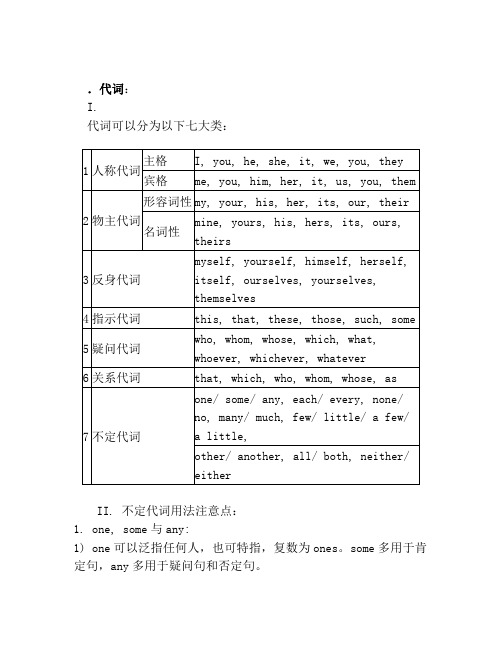
.代词:I.代词可以分为以下七大类:1人称代词主格I,you,he,she,it,we,you,they 宾格me,you,him,her,it,us,you,them2物主代词形容词性my,your,his,her,its,our,their 名词性mine,yours,his,hers,its,ours,theirs3反身代词myself,yourself,himself,herself, itself,ourselves,yourselves, themselves4指示代词this,that,these,those,such,some5疑问代词who,whom,whose,which,what, whoever,whichever,whatever6关系代词that,which,who,whom,whose,as7不定代词one/some/any,each/every,none/ no,many/much,few/little/a few/ a little,other/another,all/both,neither/ eitherII.不定代词用法注意点:1.one,some与any:1)one可以泛指任何人,也可特指,复数为ones。
some多用于肯定句,any多用于疑问句和否定句。
One should learn to think of others.Have you any bookmarks?No,I don’t have any bookmarks.I have some questions to ask.2)some可用于疑问句中,表示盼望得到肯定的答复,或者表示建议,请求等。
Would you like some bananas?Could you give me some money?3)some和any修饰可数名词单数时,some表示某个,any表示任何一个。
I have read this article in some magazine.Please correct the mistakes,if any.4)some和数词连用表示“大约”,any可与比较级连用表示程度。
中考英语必背重点知识点总结

中考英语必背重点知识点总结一、语法部分:1.时态的使用:-一般现在时:表示经常性、习惯性的动作或永恒的真理。
-现在进行时:表示现阶段正在进行的动作。
-一般过去时:表示过去一些时间发生的动作或存在的状态。
-过去进行时:表示过去一些时间正在进行的动作。
-现在完成时:表示过去发生的动作与现在的影响或结果。
-过去完成时:表示过去一些时间之前发生的动作或存在的状态。
-将来时:表示将来发生的动作或存在的状态。
2.语态的转换:-主动语态:强调动作的执行者。
-被动语态:强调动作的承受者。
3.动词的变化:- 一般现在时的第三人称单数变化规则:动词直接加-s或-es。
- 动词过去式的变化规则:大部分动词直接加-ed,规则变化的动词需要根据不同的规则进行变化。
- 动词过去分词:表示被动或完成的动作,常常与助动词have, has, had等连用。
4.代词的使用:-主格代词:作主语或主语补语。
-宾格代词:作宾语或介词宾语。
-物主代词:表示所属关系。
-反身代词:强调动作反作用于主语自己。
-指示代词:指示特指或近指的人或物。
-不定代词:表示泛指或不确定的人或物。
5.名词的单复数形式:-一般情况下,名词的复数形式在词尾加-s。
- 以-s, -x, -sh, -ch结尾的名词,复数形式加-es。
- 以辅音字母+y结尾的名词,复数形式将-y变为-ies。
- 以-f或-fe结尾的名词,复数形式将-f或-fe变为-ves。
- 以-o结尾的名词,复数形式加-es。
6.形容词和副词的比较级和最高级:- 一般情况下,形容词和副词的比较级和最高级前加more和most。
- 以-e结尾的形容词,比较级和最高级在词尾加-r和-st。
- 以重读闭音节结尾的单音节或部分双音节形容词,双写词尾字母,再加-er和-est。
-不规则变化的形容词,比较级和最高级用不同词形。
7.特殊句式:- There be句型:表示存在或发生的情况。
- It is + 形容词 + for + 人 + to do:表示对人来说是怎样的。
山东初中英语中考知识点总结

山东初中英语中考知识点总结一、词汇与短语1. 基础词汇- 常见名词、动词、形容词、副词、代词、介词等。
- 常用不规则动词的过去式和过去分词形式。
2. 短语搭配- 动词短语:look after, turn on, wait for等。
- 介词短语:in time, on behalf of, at the moment等。
- 形容词短语:be good at, be interested in, be proud of等。
二、语法知识1. 时态- 一般现在时、一般过去时、一般将来时。
- 现在进行时、过去进行时、将来进行时。
- 现在完成时、过去完成时。
- 情态动词的用法,如can, could, may, might, must, should 等。
2. 语态- 被动语态的构成和用法。
3. 非谓语动词- 动名词的构成和用法。
- 分词(现在分词和过去分词)的构成和用法。
- 不定式的构成和用法。
4. 句子结构- 简单句、并列句和复合句(包括定语从句、状语从句、宾语从句等)。
5. 特殊句式- 倒装句、省略句、强调句。
三、阅读理解1. 题型介绍- 事实细节题、推理判断题、词义猜测题、主旨大意题等。
2. 解题技巧- 快速阅读与精读结合。
- 根据上下文推断词义。
- 抓住文章结构,理解段落大意。
- 识别作者态度和目的。
四、写作技巧1. 写作类型- 描述性写作:人物、地点、事件等。
- 叙述性写作:故事、经历等。
- 议论性写作:观点、论证等。
2. 写作结构- 引言、正文、结尾。
- 段落结构:主题句、支持句、过渡句。
3. 写作技巧- 正确使用连接词,使文章连贯。
- 注意时态和语态的准确运用。
- 使用多样的句型和词汇,提高文章质量。
五、听力理解1. 题型介绍- 对话理解、短文理解、信息转述等。
2. 听力技巧- 预测内容,根据题目提示做好听前准备。
- 注意捕捉关键词和信息。
- 学会根据上下文推断未听懂的部分。
六、口语表达1. 日常交流- 问候、自我介绍、购物、旅游等场景用语。
中考英语语法考点总结

中考英语语法考点总结(一)形容词和副词I.要点A.形容词1、形容词的用法形容词是用来修饰、描绘名词的,通常在句中作定语、表语或宾补,有时还可作状语。
如:He is honest and hardworking.I found the book interesting.某些形容词与定冠词连用表示一类人作主语时,谓语通常用复数形式。
如:The rich and the poor live in different parts of the city.The English like to be with their families.多个形容词作定语修饰名词的顺序:冠词+序数词+基数词+性质状态(描述性)+形状大小+新旧老少+颜色+国籍+材料+名词。
如:the second five interesting big new red Chinese wall papers .2、形容词比较等级的形式(1)规则形式一般说来,单音节词及少数双音节词在后加-er;--est来构成比较级和最高级;其他双音节词及多音节词在前加more,most.如:great-greater-greatestbusy-busier-busiestimportant-more important-(the)most important(2)不规则形式good(well)-better-bestbad(ill)-worse-worstmany(much)-more-mostlittle-less-least(3)形容词比较等级的用法①表示两者的比较,用形容词的比较级+than.如:He is cleverer than the other boys.This one is more beautiful than that one.②表示两者以上的比较,用"the+形容词最高级(+名词)+of(in)…"如:He is the cleverest boy in his class.③表示两者是同等程度,用"as+形容词原级+as".如:He is as tall as I.I have as many books as you.④越…越…例如:The more I learn,the happier I am.⑤You can never be too careful.越小心越好又如:You can never praise the teacher too highly.你怎么赞扬这个老师也不过分。
中考英语语法知识总结(全)
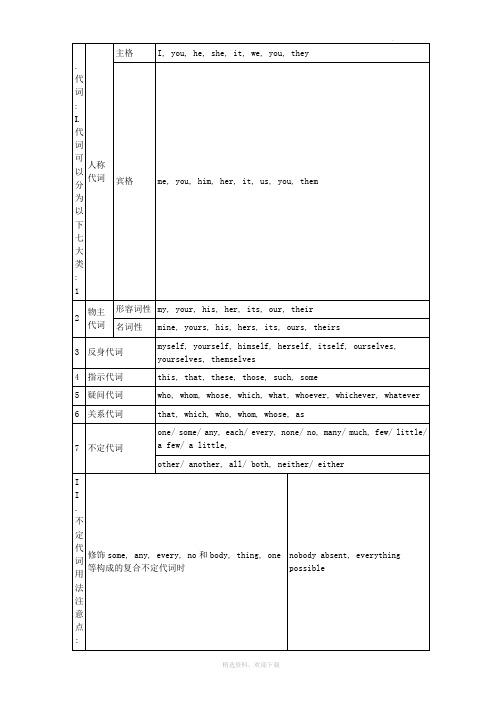
2) some可用于疑问句中, 表示盼望得到肯定的答复, 或者表示建议, 请求等。
Would you like some bananas?
Could you give me some money?
3) some 和any修饰可数名词单数时, some表示某个, any表示任何一个。
1.同级比较时常常用 as…as…以及not so(as)…as…如: I am not so good a player as you are.
2.可以修饰比较级的词有: much, many, a lot, even, far, a bit, a little, still, yet, by far, any, a great deal。
always, often, frequently, seldom, never
2
地点副词
here, nearby, outside, upwards, above
6
疑问副词
how, where, when, why
3
方式副词
hard, well, fast, slowly, excitedly, really
Every student has strong and weak points./ Every one of us has strong and weak points.
3.none和no:
no等于not any, 作定语。none作主语或宾语, 代替不可数名词, 谓语用单数, 代替可数名词, 谓语单复数皆可以。
II.不定代词用法注意点:
1.one, some与any:
1) one可以泛指任何人, 也可特指, 复数为ones。some多用于肯定句, any多用于疑问句和否定句。
中考英语知识点全汇总
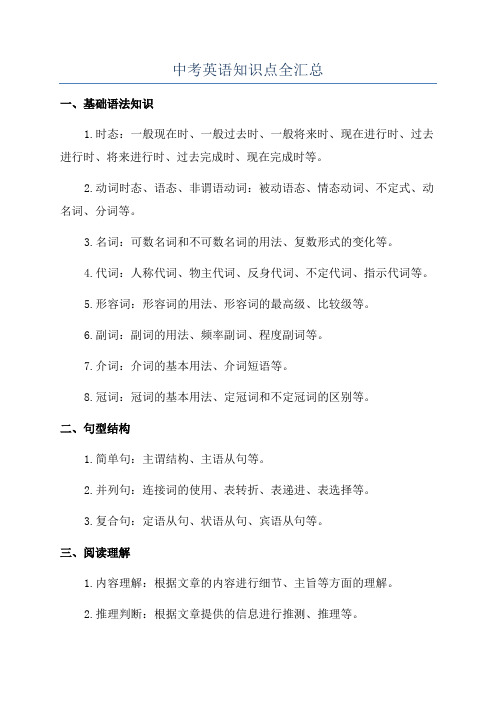
中考英语知识点全汇总一、基础语法知识1.时态:一般现在时、一般过去时、一般将来时、现在进行时、过去进行时、将来进行时、过去完成时、现在完成时等。
2.动词时态、语态、非谓语动词:被动语态、情态动词、不定式、动名词、分词等。
3.名词:可数名词和不可数名词的用法、复数形式的变化等。
4.代词:人称代词、物主代词、反身代词、不定代词、指示代词等。
5.形容词:形容词的用法、形容词的最高级、比较级等。
6.副词:副词的用法、频率副词、程度副词等。
7.介词:介词的基本用法、介词短语等。
8.冠词:冠词的基本用法、定冠词和不定冠词的区别等。
二、句型结构1.简单句:主谓结构、主语从句等。
2.并列句:连接词的使用、表转折、表递进、表选择等。
3.复合句:定语从句、状语从句、宾语从句等。
三、阅读理解1.内容理解:根据文章的内容进行细节、主旨等方面的理解。
2.推理判断:根据文章提供的信息进行推测、推理等。
3.表达能力:根据文章的要求进行写作、归纳总结等。
四、口语表达1.询问:询问信息、询问意见等。
2.辩论:陈述自己的观点、提出理由等。
3.请求:请求帮助、请求许可等。
4.提醒:提醒他人注意事项、提醒日程安排等。
5.道歉:道歉表达、解释原因等。
五、写作技巧1.写作表达:书信写作、日记写作、演讲稿写作等。
2.句子表达:句子的连贯性、句子的多样性等。
3.表达方式:使用形容词、副词、比喻、排比等方式进行表达。
4.逻辑结构:文章段落的开头、结尾、过渡等。
六、听力技巧1.理解题目:理解题干的意思、答题要求等。
2.抓关键词:抓住关键词帮助理解听力材料。
3.预测猜测:根据题干的提示预测可能听到的内容。
4.注意视听:注意听力材料中的重要信息、时间、地点等。
七、词语运用1.同义词、反义词的辨析。
2.词组的搭配。
3.词义的辨析。
八、语篇搭配1.对话:问答形式、交际用语等。
[精]中考英语常考的重点句型及短语汇总
![[精]中考英语常考的重点句型及短语汇总](https://img.taocdn.com/s3/m/b7c1f0500c22590103029d51.png)
中考英语常考的重点句型及短语汇总一、重点句型1.So + be/助动词/情态动词/主语.前面陈述的肯定情况也适于另一人(物)时,常用到这种倒装结构,表示“另一人(物)也如此。
”前面陈述的否定情况也适于另一人(物)时,常用“Neither/ Nor + be/助动词/情态动词+主语.”这种倒装结构。
注意:“So+主语+be/助动词/情态动词.”这一句型常用于表示赞同,进一步肯定对方的看法,表示“的确如此。
”“是呀。
”2.Turn right/leftat the first/second/…crossing.这一指路的句型意为“在第一/二/……个十字路口向右/左拐。
”相当于Take the first /second/…turning on theright/left.3.It takes sb.some time to do sth.此句型表示“干某事花了某人一段时间。
”其中的it是形式主语,后面的动词不定式(短语)才是真正的主语.4.…think/find + it + adj. + to do sth.此句型中的it是形式宾语,不可用其它代词替代,形容词作宾语的补足语,后面的动词不定式(短语)才是真正的宾语。
5.What’s wrong with…?此句型相当于What’s the matter/ trouble with…?后跟某物作宾语时,意为“某物出什么毛病了?”后跟某人作宾语时,意为“某人怎么了?”6.too…to…在so…that…复合句中,that后的句子是否定句时,常与简单句too…to…(太……而不能……)进行句型转换。
在so…that…复合句中,that后的句子是肯定句时,常与简单句…enough to…进行句型转换.7.Sorry to hear that.全句应为I’m sorry to hear that. 意为“听到此事我很难过(遗憾)。
”常用于对别人的不幸表示同情、遗憾之意。
中考英语知识点总结
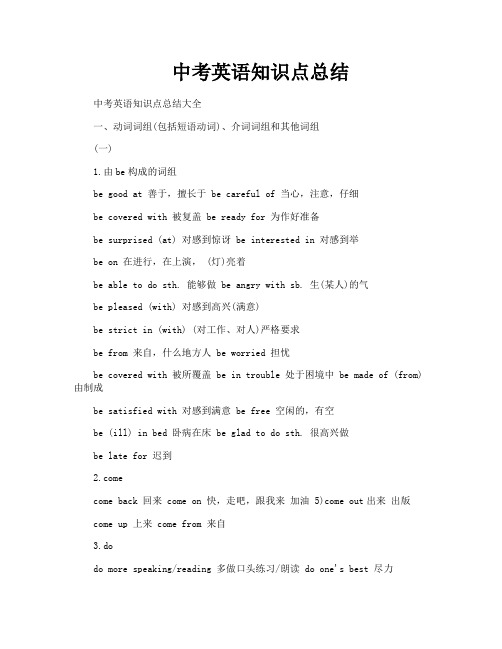
中考英语知识点总结中考英语知识点总结大全一、动词词组(包括短语动词)、介词词组和其他词组(一)1.由be构成的词组be good at 善于,擅长于 be careful of 当心,注意,仔细be covered with 被复盖 be ready for 为作好准备be surprised (at) 对感到惊讶 be interested in 对感到举be on 在进行,在上演, (灯)亮着be able to do sth. 能够做 be angry with sb. 生(某人)的气be pleased (with) 对感到高兴(满意)be strict in (with) (对工作、对人)严格要求be from 来自,什么地方人 be worried 担忧be covered with 被所覆盖 be in trouble 处于困境中 be made of (from) 由制成be satisfied with 对感到满意 be free 空闲的,有空be (ill) in bed 卧病在床 be glad to do sth. 很高兴做be late for 迟到ecome back 回来 come on 快,走吧,跟我来加油 5)come out出来出版come up 上来 come from 来自3.dodo more speaking/reading 多做口头练习/朗读 do one's best 尽力do some shopping (cooking reading, cleaning)买东西(做饭菜,读点书,大扫除)do morning exercises 做早操do eye exercises 做眼保健操 do well in 在某方面干得好4.get1)get ready for (=be ready for) 为作好准备 2)get on (well) with 与相处(好)3)get back 返回 4)get rid of 除掉,去除 5)get in 进入,收集6)get on/off 上/下车 7)get to 到达 8)get there 到达那里5.give1)give sb. a call 给打电话 2)give a talk 作报告3)give a lecture (a piano concert)作讲座(举行钢琴音乐会)4)give back 归还,送回 5)givesome advice on 给一些忠告6)give lessons to 给上课 7)give in 屈服 8)give up 放弃9) give sb. a chance 给一次机会6.go1)go ahead 先走,向前走,去吧,干吧 2)go to the cinema 看电影 3)go to bed 睡觉4)go to school (college) 上学(上大学) 5)go to (the) hospital 去医院看病6)go over 复习/ go over to 朝走去7)go fishing/skating/swimming/shopping 去钓鱼/滑冰/游泳/买东西8)go home (there) 回家去(去那儿) 9)go round 顺便去,绕道走10)go up 上去 11)go out for a walk 外出散步12)go on (doing) 继续(做)13)go upstairs/downstairs 上/下楼 14)(the lights) go out (灯)熄了7. havehave a football match (basketball match) 举行一场足球(蓝球)赛have a try 试一试 have a good/wonderful time 玩得很高兴 have a report (talk) on 听一个关于的报告have breakfast/lunch/supper 吃早饭/午饭/晚饭have a meal (three meals) 吃一顿饭(三餐饭) have (have got) a headache 头痛have a fever 发烧have a cough (a cold) 咳嗽(感冒) have a look (at) 看一看have a rest (a break) 休息一会儿(工间或课间休息) have a talk 谈话have a swim/walk 游泳/散步 have a sports meet (meeting) 开运动会have something done 让人(请人)做have a word with 与谈几句话8.helphelp sb. with sth. help sb. do sth. 在方面帮助帮助做help each other 互相帮助9.keep1)keep up with 跟上,不落后于2)keep silent/quiet 保持沉默/安静3)keep sb. doing sth. 使一直做4)keep one's diary 记日记10.make1)make a noise (a lot of noise, much noise, noises)吵闹(十分嘈杂,响声)2)make a living 谋生 3)make sb. do sth. 让某人做4)make faces (a face)做鬼脸5)make friends (with)与交朋友 6)make a mistake (mistakes)犯错误7.make room/space for 给腾出地方 8.make a sentence (sentences)with 用造句9)make a fire 生火11.look1)look out of (outside) 往外看(看外面) 2)look up a word (in the dictionary) 3)look up 往上看,仰望 4)look after 照管,照看,照顾5)look for 寻找6)look like 看上去像7)look fine/well/tired/worried 看起来气色好/健康/疲劳/忧虑8)look out 当心,小心 10)look around 朝四周看11)look at 看着12.put1)put on 穿上(衣服),戴上(帽子),上演(戏剧) 2)put up 建造,搭起,挂起,举起,张帖 4)put one's heart into 全神贯注于 put away 把放好 put off 推迟 put out 灭火5)putdown 把放下13.set1)set up 竖起,建起 3)set out 出发3.)set an example for 为树立榜样14.take1)take one's advice 听从某人劝告2)take out 拿出,取出3)take down 拿下4)take place 发生5)take one's place 坐的座位,代替某人职务6)take the place of 代替7)take a walk/rest 散步/休息8)take it easy 别紧张9)take care of 关心/照顾/保管10)take away 拿走 11)take off 脱下(衣,帽,鞋等)拿掉12)take (an active) part in (积极)参加(活动 13)take photos 拍照14)take some medicine 服药 15)take a bus/train, boat/ 乘公共汽车,火车/船15.turn1)turn on 开,旋开(电灯,收音机等) 2)turn off 关上(电灯,收音机等)3)turn in 交出,上交 4)turn down (把音量)调低 5)turnover 把翻过来重点句型1.I think意为“我认为”,是对某人或某事的看法或态度的一种句型。
九年级中考英语知识点总结

九年级中考英语知识点总结一、词汇。
1. 重点单词。
- 动词。
- be动词(am/is/are/was/were):用于表示主语的状态(是……)。
例如:I am a student.(一般现在时);He was at home yesterday.(一般过去时)。
- have/has(had):表示“有”或完成时态中的助动词。
如:She has a book.(一般现在时);They have finished their work.(现在完成时)。
- do/does(did):可作助动词用于构成疑问句和否定句,也可作实义动词表示“做”。
例如:Do you like English?(一般现在时的一般疑问句);He did his homework last night.(一般过去时)。
- 名词。
- 可数名词:有单复数形式。
如:book - books,student - students。
规则变化一般在词尾加 -s或 -es(以s、x、ch、sh结尾的加 -es等),不规则变化需要特殊记忆,如:man - men,child - children。
- 不可数名词:没有复数形式,如:water,rice,information等。
表示数量时,用量词,如:a glass of water,two pieces of information。
- 形容词和副词。
- 形容词用于修饰名词,如:a beautiful flower。
副词用于修饰动词、形容词或其他副词,如:He runs quickly.;She is very beautiful. 形容词和副词的比较级和最高级:- 规则变化:一般在词尾加 -er(比较级)、-est(最高级);以重读闭音节结尾且词尾只有一个辅音字母的,双写该辅音字母再加 -er、-est;以“辅音字母 +y”结尾的,把y变为i再加 -er、-est。
例如:big - bigger - biggest;hot - hotter - hottest;easy - easier - easiest。
英语重点单词和短语用法总结

中考英语重点单词和短语用法总结1cost / take / spend / pay 花费2花费时间做*事:It takes sb some time to do sth . = sb spend some time 〔in〕doing sth .= sb spend some time onsth .*人花钱买*物:sb spend some money on sth .= sb pay some money for sth . = sth cost sb . some money .※spend 和pay 主语都是人,cost 主语是物。
※spent 还可以指“度过〞→ How did you spend your weekend .2thanks for为…而感thanks to 多亏/由于3感慨句:多么… what + 名词how + 形容词/ 副词4因为、由于:because〔连词〕+从句:〔表示原因〕because of〔介词短语〕+ 名词〔短语〕= thanks to※because和so不能同时连用。
5来自:be from = e from6How ~How often 对频率提问〔多久一次〕→答复用表示频率的副词或短语How long 对一段时间提问〔多久〕→答复用表示一段时间的状语How soon 对将来时间提问〔多久〕→答复用in+时间段How far 询问多长距离〔多长〕7乘交通工具:take a / the +交通工具在句中作谓语by+交通工具=on a 交通工具在句中作方式状语交通工具有:train/bus/car/ta*i/boat/subway/plane ...※骑自行车、马或驴用ride :ride one’s bike / ride a horse / ride a donkey in one’s car8对不起:E*cuse me 〔劳驾,客套话〕Sorry 〔表示抱歉〕9声音:sound 〔自然界各种声音〕noise〔噪音〕voice〔悦耳的声音:嗓子〕10look like 〔外貌看起来像… 〕be like 〔性格像… 〕11take… to … 带去bring…to …带来fetch 没有方向性〔强调来回〕12一些:some 用于肯定句any 用于否认句和疑问句※在一般疑问句中,认为对方的答案会是肯定的,或期望得到对方肯定答复时,也用some。
初中中考英语必考知识点总结
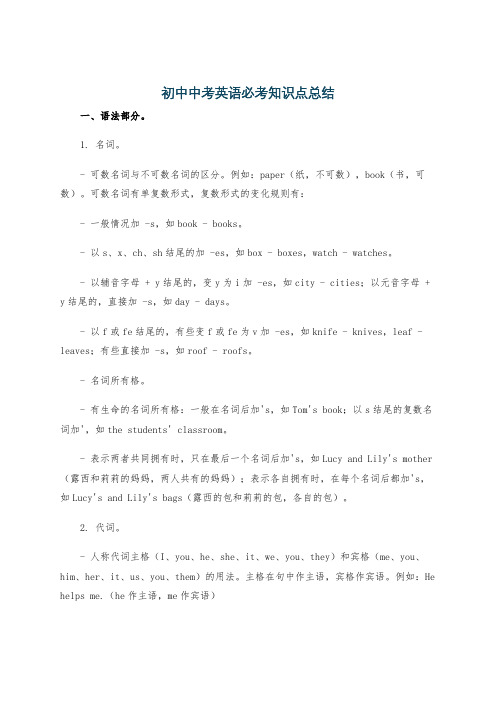
初中中考英语必考知识点总结一、语法部分。
1. 名词。
- 可数名词与不可数名词的区分。
例如:paper(纸,不可数),book(书,可数)。
可数名词有单复数形式,复数形式的变化规则有:- 一般情况加 -s,如book - books。
- 以s、x、ch、sh结尾的加 -es,如box - boxes,watch - watches。
- 以辅音字母 + y结尾的,变y为i加 -es,如city - cities;以元音字母 + y结尾的,直接加 -s,如day - days。
- 以f或fe结尾的,有些变f或fe为v加 -es,如knife - knives,leaf - leaves;有些直接加 -s,如roof - roofs。
- 名词所有格。
- 有生命的名词所有格:一般在名词后加's,如Tom's book;以s结尾的复数名词加',如the students' classroom。
- 表示两者共同拥有时,只在最后一个名词后加's,如Lucy and Lily's mother (露西和莉莉的妈妈,两人共有的妈妈);表示各自拥有时,在每个名词后都加's,如Lucy's and Lily's bags(露西的包和莉莉的包,各自的包)。
2. 代词。
- 人称代词主格(I、you、he、she、it、we、you、they)和宾格(me、you、him、her、it、us、you、them)的用法。
主格在句中作主语,宾格作宾语。
例如:He helps me.(he作主语,me作宾语)- 物主代词分为形容词性物主代词(my、your、his、her、its、our、your、their)和名词性物主代词(mine、yours、his、hers、its、ours、yours、theirs)。
形容词性物主代词后面要接名词,名词性物主代词相当于名词,可以单独使用。
初中中考所有的英语知识点(汇总大全)

初中中考所有的英语知识点(汇总大全)初中中考所有的英语知识点代词人称代词,物主代词,反身代词类别主格宾格形容词性物主代词名词性物主代词反身代词第一人称单数I me my mine myself复数 we us our ours ourselves第二人称单数 you you your yours yourself复数 you you your yours yourselves第三人称单数 he him his his himselfshe her her hers herselfit itits its itself复数 they them their theirs themselves1.人称代词人称代词it的特殊用法:一般it指“它”,但在表示天气、时间、距离等时,用it来代替,此时的it并不译为“它”。
当三个人称代词(单数)同时出现时,其先后顺序为you,he,I。
而复数一般采用we,you,they顺序。
2.物主代词物主代词的用法:形容词性物主代词后面一定要跟上一个名词。
名词性物主代词可作主语、表语、宾语。
3.反身代词1)反身代词的构成分两种:第一、二人称反身代词在形容词:性物主代词后加上self或selves,第三人称的反身代词在宾格代词后加上self或selves.2)反身代词的用法:一种是作宾语,由主语发出的动作又回到动作者本身。
如:I enjoyed myself at the party.另一种是作名词或代词的同位语;用来加强语气。
如:I can do it myself.初中中考所有的英语知识点梳理主要不定代词的用法:(1)one的用法A. one作为代词可以指人,也可以指物。
B. one,ones (one的复数形式) 可用来代替前面出现过的少数名词,以避免重复。
C. one的前面可用this,that,the,which等词来修饰。
D. 常有a+形容词+one这一形式。
it和one的用法区别:it用来指特定的东西,而one则用于替代不特定的东西。
- 1、下载文档前请自行甄别文档内容的完整性,平台不提供额外的编辑、内容补充、找答案等附加服务。
- 2、"仅部分预览"的文档,不可在线预览部分如存在完整性等问题,可反馈申请退款(可完整预览的文档不适用该条件!)。
- 3、如文档侵犯您的权益,请联系客服反馈,我们会尽快为您处理(人工客服工作时间:9:00-18:30)。
afifteen-year-old boy一个15岁的男孩
9. interestedadj.感兴趣的,指人对某事物感兴趣,往往主语是人
interestingadj.有趣的,指某事物/某人具有趣味,主语往往是物
10.in the last few years.在过去的几年内常与完成时连用如:
Ihave livedin China in the last few years.在过去的几年内我在中国住。
I don`t know what to do next..我不知道下一步做什么。
12.make sb./ sth. +形容词make youhappy
make sb./ sth. +动词原形make himlaugh
13.it seems that +从句
It seems + adj……
It seem + to be
5. too many许多 修饰可数名词
如:too manygirls
too much许多 修饰不可数名词
如:too muchmilk
much too太 修饰形容词
如:much toobeautiful
ed to do sth.过去常常做某事
否定形式:
didn’t use to do sth.
看起来好像……
如:It seems that he has changed a lot.看起来他好像变了许多。
14.看起来好像…sb. seem to do sth.He seems to feelvery sad.
it seems that +从句It seems thathe feels very sad.他看起来好像很伤心。
①肯定陈述句+否定提问
如:Lilyisa student,isn’t she?
Lilywillgo to China,won’t she?
②否定陈述句+肯定提问如:
Shedoesn’t comefrom China,does she?
Youhaven’t finishedhomework,have you?
③提问部分用代词而不用名词Lilyis a student, isn’tshe?
④陈述句中含有否定意义的词,如:little, few, never, nothing, hardly等。
其反意疑问句用肯定式。
如:Heknows littleEnglish,does he?他一点也不懂英语,不是吗?
Theyhardly understoodit,did they?他们几乎不明白,不是吗?
系动词不能独立作谓语,要和表语一起构成谓语
常用的连系动词有:look, feel, be, become, get, turn, smell, taste, stay(保持), kept等。连系动词除be和become等少数词可接名词作表语外,一般都是接形容词。如:Theyare very happy.
He becamea doctortwo years ago.
Shefelt very tired.
15.help sb. with sth.帮某人某事
help sb. (to ) do sth.帮某人做某事
help sb out帮某人摆脱困难
help do sth帮助做某事
help with sth.如:Theyhelp with this problem.
either也(用于否定句)常在句末
too也(用于肯定句)常在句末
4.see sb. / sth. doing看见某人正在做某事强调正在发生
see sb. / sth. do看见某人做了或经常做某事
如:She saw himdrawinga picture in the classroom.她看见他正在教室里画画。
11. how to swim怎样游泳
不定式与疑问词连用:
动词不定式可以和what, which, how, where, when等引导的疑问句连用,构成不定工短语。如:
The question iswhen to start.问题是什么时候开始。
I don’t knowwhere to go.我不知道去哪建议的句子:
①What/ how about +doingsth. ?
如:What/ How about going shopping ?
②Why don’t you +dosth.?
如:Why don’t you go shopping?
③Why not +dosth. ?
used not to do sth.
如:Heused toplay football after school.放学后他过去常常踢足球。
Didheuse to playfootball? Yes, Idid. No, Ididn’t.
Hedidn’t use to smoke.他过去不吸烟。
7.反意疑问句
She helped mewith English.她帮助我学英语。
She helped me(to) study English。她帮助我学习英语。
Theyhelp you relax.他们帮助你放松
16. fifteen-year-old作形容词15岁的
fifteen-year-olds作名词指15岁的人
如:Why not go shopping?
④Let’s +dosth.
如:Let’s go shopping
⑤Shall we/ I +dosth.?
如:Shall we/ I go shopping?
2.first of all首先
.to begin with一开始
later on后来、随
3.also也、而且(用于肯定句)常在句子的中间
8. be interested in sth.对…感兴趣
take an interest in
be interested in doing sth.对做…感兴趣
如:Heis interested in math, but heisn’t interested in speaking
English.他对数学感兴趣,但是他对说英语不感兴趣。
